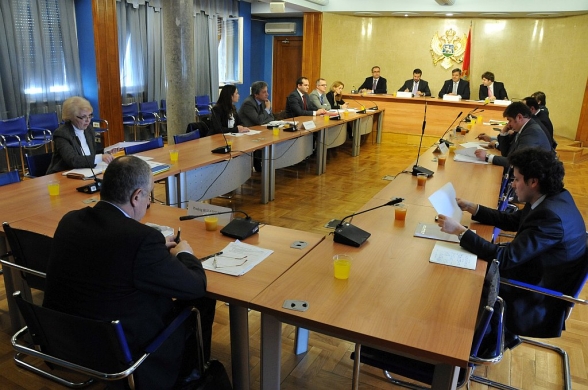At the nineteenth meeting of the Committee on European Integration, attended by Mr Aleksandar Andrija Pejović, State Secretary and Chief Negotiator of Montenegro with the EU; Mr Nikola Vukićević, Negotiator for Chapter 32 and 33, as well as Ms Ana Krsmanović, Head of Working Group for Chapter 32, they considered the Draft negotiating position of Montenegro for Intergovernmental Conference on Accession of Montenegro to the European Union for Chapter 32 - Financial control and the Draft negotiating position of Montenegro for Intergovernmental Conference on Accession of Montenegro to the European Union for Chapter 33 - Financial and budgetary provisions.
They pointed out at the meeting that the Decision on forming the Working Group for Preparation of Negotiations on the Accession of Montenegro to the European Union in the area of EU acquis relating to the Negotiation Chapter 32 - Financial control was adopted on 11 April 2013. The screening process for the chapter, consisting of four areas: public internal financial control, external audit, protection of the EU’s financial interests and protection of the Euro against counterfeiting, lasted from 16 May to 19 June last year. It has been pointed out that the public internal financial control covers the overall system of financial control that is carried out internally by the government through organisations to which it delegated that function, while in the field of external audit it is expected that the candidate countries should implement norms that envisage functional, institutionally and financially independent, supreme audit institutions that submit their reports exclusively to the Parliament. For the first two areas covered by the Chapter, public internal financial control and external audit, there is no legal framework that could be transferred to the national legislation, but the implementation of these standards is carried out through screening and commitment of the candidate country that it will adopt international standards of internal control and audit, as well as the EU best practice.
With regard to Chapter 33, it has been pointed out that the negotiations defined projections, billing, payment and control of the funds that Montenegro should allocate for the European Union budget, which would allow it to use the funds from the European Union budget intended for agricultural and rural development, investment in infrastructure projects, development of underdeveloped regions and other projects that should be recognised by Montenegro as significant and which would meet the necessary criteria set by the EU. It has been pointed out at the meeting that the progress in the field of financial and budget provisions would depend on the progress in the fields of statistics, financial control, customs, agriculture and taxation.
Members of the Committee on European Integration unanimously provided a positive opinion on the Draft negotiating position of Montenegro for Intergovernmental Conference on Accession of Montenegro to the European Union for Chapter 32 - Financial control and the Draft negotiating position of Montenegro for Intergovernmental Conference on Accession of Montenegro to the European Union for Chapter 33 - Financial and budgetary provisions.









